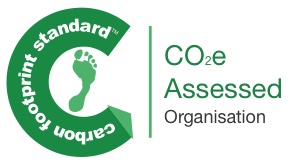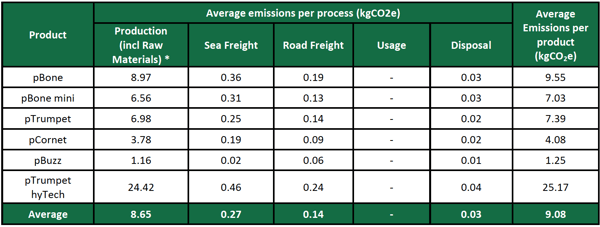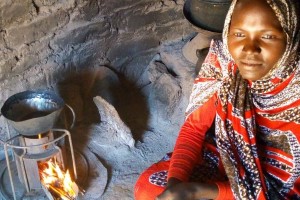
As a team of musicians, parents and teachers, we care very much about the impact we have on our environment, both individually and as a company.
As consumers, just like you, our buying decisions are influenced by how sustainable the products are that we buy for our family. We're delighted therefore to be able to share that Warwick Music Group and all our products: pBone, pBone mini, pTrumpet, pCornet, pTrumpet hyTech, pBuzz, pBugle and pCorder - are Carbon Neutral.
What this means is that the carbon emissions caused by our instruments have been balanced by funding an equivalent amount of carbon savings elsewhere in the world. These savings are generated through helping to fund renewable energy projects and energy efficiency projects - many of which bring additional social and community benefits in developing countries as well as reducing greenhouse gases.
Is plastic a more sustainable choice?
Disposable plastics present a huge problem for the planet. According to Greenpeace, “A truckload of plastic enters the ocean every single minute and UK supermarkets produce 800,000 tonnes every year."
This is scary stuff, why would you even entertain buying a plastic trumpet and trombone? The simple answer is that plastic instruments are not disposable like bags or straws. They can last many years and in our case are made from fully recyclable ABS plastic.
Brass instruments in contrast are actually worse for the environment, use a lot more energy as well as some pretty nasty materials in their manufacturing processes such as lead and nickel.

Plastic therefore can be a more-sustainable choice, but it is not a catch-all for every plastic musical instrument maker – far from it!
Plastic instrument manufacturers bear an even greater responsibility because, unlike the traditional brass instrument manufacturers who cannot easily change the way they manufacture, it is so much easier for us to be sustainable and make greener choices for our planet.
The pBone environmental impact
We recently commissioned some research with Keele University to assess our own impact. We were delighted that our hard work around sustainability and the environment has in fact saved the equivalent of over 72,000 trees to date!
 In 2020, we also began a very detailed analysis of our carbon impact on the manufacturing and distribution of all our products. We engaged the UK's leading sustainability assessor and validator, Carbon Footprint, to independently audit our findings.
In 2020, we also began a very detailed analysis of our carbon impact on the manufacturing and distribution of all our products. We engaged the UK's leading sustainability assessor and validator, Carbon Footprint, to independently audit our findings.
This included: a detailed investigation of the materials we use, the distance every product travels from its suppliers to the seaports, transport by container ships, and then lorries to the end retailers and the end-of-life disposal by our consumers.
Below are the average kg of CO2 emissions for each of our instruments. Now, having gone through this assessment we are focusing on how we can reduce our CO2 emissions in the future such as changing the material for our nylon bags to a more sustainable fabric and using more efficient forms of transportation.

Carbon offset-certified projects
Now we have had our carbon impact independently assessed, we are then able to offset our impact each year. We decided to do this by supporting two certified projects which we felt best reflected our values as an organisation.
1. Fuel-Efficient Stoves For North Darfur Women, Sudan

This project replaces three stone fires with EzyStove®, which facilitate 40% in wood savings. The stove also reduces smoke particles that are harmful to the eyes and lungs by 70% as well as promotes other socio-economic benefits.
The revenues generated by the sale of the carbon offsets contribute towards expanding the project with 50% of the stove costs, the assembly of the stoves, training for women, monitoring, project management and payment facilities for beneficiaries to keep the costs of the stoves at an affordable price.
Working across 10 villages within two localities, the project alleviates poverty through savings in time and money, advances gender equality by providing managerial capacity development to women and reduces greenhouse gas emissions associated with burning non-renewable biomass in a resource-deprived region.
This cooperative project between the funding partners, the Women Development Association Network (the implementing entity) and the UN World Food Programme (the technical advisor) is the first of its kind in Sudan.
-
- Distributed around 5,000 stoves in 10 villages
- Reduced approximately 20,000 tCO2e
- Saved 13,000 tonnes of wood
- Enabled many healthier and cleaner kitchens
- Created savings and reduced the energy budget for every single (100%) household participating in this project
- Facilitated cooperation and provided an additional source of income through the recruitment of local communities for the stove assembly
- Empowered women and strengthened their financial management capabilities.

2. Providing Wildlife Habitats And Helping Kenyan Reforestation
The Kikuyu escarpment forest with its great mixture of both large and small wildlife animals, birds and butterflies, has been the beautiful gateway to the Great Rift Valley until the degradation trend struck. This environment is the source of water and thus livelihood to the neighbouring communities.
In just a few years, wanton and deliberate destruction of the escarpment environment through charcoal burning, logging for timber and fuel wood, ring-debarking of medicinal trees and overgrazing has resulted in the virtual depletion of forest vegetation cover. This has in return resulted in the drying of springs/rivers/streams, soil erosion, emigration of wildlife/birds, scorching sun, human-wildlife conflict and the scarring of once a beautiful scenic landscape that generated some income through tourism.
Sustainable benefits include:
-
- Poverty reduction through employment creation
- Water catchment areas will be conserved providing water/food security
- Birds, butterflies and other wildlife habitats will be conserved and others created
- Bees attracted by the trees in flowering seasons will benefit the community through the sale of honey hence reducing poverty
- The sale of fruit will help the community earn extra income
- Nutritional benefit from some of the fruit trees planted like the Avocado trees which are of great nutritional value
- Ecotourism will be promoted with better forests giving alternative occupation to those previously engaging in destructive forest activities
- The pastoral communities will have pastures for their animals during drought times
- Some of our teams have orphans and Persons Living With HIV/Aids (PLWHA)
- The trees also assist in the prevention and control of soil erosion
- Beautification of our locality and the roads

Read More...
Read our blog by CEO Steven Greenall - Problems with plastic instruments, 5 things to consider before you buy
Before we offset, how do we reduce our impact? Read our blog Reduce, Reuse, Recycle
Steven has over twenty years of experience working in the music industry. With degrees in Electrical Engineering and an MA in European Cultural Policy & Administration from the University of Warwick, where he now serves as a Course Tutor on their MA in Creative and Media Enterprises, Steven served as Executive Director of a non-profit international music association based in the United States from 2000 – 2007.
Steven is founder and CEO of Warwick Music Group now known as pBone Music, and started playing the trombone at the age of nine. Based in North Warwickshire, the company manufactures musical instruments that make the joy of music accessible. sustainable and fun including the world's first plastic trombone, pBone, which has sold over 250,000 units worldwide and won major international awards including the prestigious Queen's Award for Enterprise (Innovation) in 2019.
He was elected as a board director for the UK music industry trade body, the Music Industries Association, in 2019 becoming its chair in 2020, and is frequently interviewed or invited to present guest lectures on cultural entrepreneurship, music education, and the future of the music industry. At the request of the owner, Denis Wick, Steven joined the board of Denis Wick Products in 2021 subsequently being appointed their Chief Executive Officer in 2022, a role he performs alongside his role as CEO for pBone Music.
Steven lives in Warwickshire with his wife, Kate, their three young children, two ponies and a faithful labrador, and enjoys coaching his local youth rugby team.
Topics:

